2022 - 2023 Annual Report










Working towards a truly just, healthy and peaceful world.
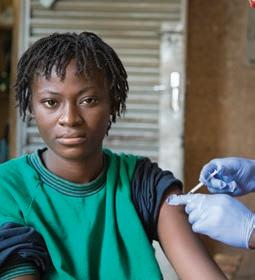
















Working towards a truly just, healthy and peaceful world.






InApril 2022, as PWRDF’s scal year began, the world was witnessing the mounting horrors of the invasion of Ukraine that occurred just two months before. Children and the elderly were among the nearly one third of Ukrainians who were forced to ee their homes, to other parts of Ukraine or to nd refuge in other countries.
PWRDF responded quickly. We worked closely with the ecumenical ACT Alliance to support refugees in Hungary and with HelpAge to support refugees in Moldova. Eight ambulances were purchased for rst responders’ use. Partners provided emergency food, shelter and drinking water and cared for people with disabilities. They purchased generators, repaired furnaces and supplied hundreds of sleeping bags for the cold winter months. Given so much uncertainty, fear and displacement, PWRDF funds also supported the care of mobile psychologists responding to the trauma of people on the move.
Canadian Anglicans responded quickly, too, donating more than $1.2 million to PWRDF since the war began. These gifts have allowed us to support seven partners. They are among the partners in 33 countries whose work we have funded between April 1, 2022 and March 31, 2023. It is work that gives us pause: hunger and famine worsens in Eastern Africa and as near to us as Haiti, where PWRDF continues to support women’s cooperatives, safe water, food security and trauma counselling.
PWRDF’s vision for a truly just, healthy and peaceful world remains constant. Our work together demonstrates our love for God and love for our neighbours, whose rights are often disregarded.

Our partners stand up for the LGBTQIA+ community in El Salvador and they empower women through agricultural training in Uganda. Our partners in Canada’s Indigenous communities work to reclaim their language and culture, which was so grievously taken away from them. “PWRDF invests in our dignity,” said a volunteer with our partners in Colombia, working to provide livelihood opportunities.
Caring for creation is also central to PWRDF and our partners, as well as to our volunteers working in churches to fundraise, organize events and promote PWRDF in their communities. The interconnectedness runs deep as God calls us to care for this increasingly fractured planet.
This Annual Report is lled with stories of community strength, care and empowerment. Please do share with others. Thank you to our sta , to our many volunteers, donors and other supporters for walking with us on this journey towards a truly just, healthy and peaceful world, for the dignity and wellbeing of all.
 Will Postma, Executive Director
Valerie Maier, President
Will Postma, Executive Director
Valerie Maier, President
 Valentine Yakosleva Pomaza is living in a temporary home in another part of Ukraine.
PHOTO: SIMONCHAMBERS/ACTALLIANCE
Valentine Yakosleva Pomaza is living in a temporary home in another part of Ukraine.
PHOTO: SIMONCHAMBERS/ACTALLIANCE
100 Indigenous people accessed an inner city program. (Winnipeg)
118 families were supported with cash assistance when evicted from community housing. (Toronto)
48 Indigenous youth from 32 communities were trained in water monitoring.
(Pikangikum, Ontario)
500 families from Tzeltal and Q’eqchi´ Indigenous communities achieved food security through sustainable agriculture.
(Mexico and Guatemala)
114 young people were trained in environmental journalism for the radio. (Colombia)
22 Indigenous students participated in a future generations and community wellbeing project. (Montreal)
400 people received trauma counselling after earthquake. (Haiti)
350 women gained leadership skills. (Haiti)
1,440,079 COVID-19 home care visits were made. (Mali)
1,743 farmers learned how to improve their business productivity. (Colombia)
878 women and survivors of sexual violence were reintegrated into their communities with job training. (Democratic Republic of the Congo)
From April 1, 2022 to March 31, 2023, PWRDF supported 76 projects in 33 countries. Read some of the highlights here and on the following pages.
$1,939,933
$6,828,929
190 women were diagnosed and treated for osteoporosis at Ahli Arab Hospital. (Palestinian Territories)
640 South Sudanese returning home received 11 months of cash transfers to buy food. (South Sudan)
914 adolescents learned more about Sexual and Reproductive Health Rights. (Uganda)
6,730 people with disabilities and their families received supplies to get through the cold winter with power outages. (Ukraine)
3,410 Syrian refugees were provided with food vouchers. (Jordan)
883 children learned in a childfriendly space at a refugee camp. (Ethiopia)
1,500 trees were planted by students. (Uganda)
500 households received food, water, tarps and tents when oods forced them from their homes. (Pakistan)
2,795 women who are Dalit, Indigenous or living with HIV and AIDS or disabilities were empowered with education sessions. (Nepal)
81,383 refugees learned about substance abuse through a prevention program. (Thai-Burmese border)
2,704 adolescents were steered away from harmful behaviour by playing soccer, netball and other sports. (Zambia)
8,000 tree seedlings were planted by Congolese living in refugee camp. (Tanzania)
48 remote health clinics were out tted with solar power.
(Mozambique)
As the Horn of Africa is su ering through the worst drought in 40 years, PWRDF partners nd themselves squarely on the front line of climate change. Mary Obiero of Church World Service in Kenya notes “the people living in these conditions have done nothing to create this problem. Absolutely nothing.”
But they are working to nd a solution. In the Chimanimani mountains of Zimbabwe, PWRDF partner TSURO Trust collaborates with local farmers to adapt to climate change and meet their families’ basic needs through agroecology. PWRDF supported TSURO’s successful bid to grant the region UNESCO biosphere status.
Though we have always known how vital water is to our health, less well known is that water has always cooled our planet, writes Richard Librock, PWRDF’s External Grants Funding Manager who works with many of our partners on climate mitigation.


“Cooling the planet is now more important than ever because global warming is increasing the frequency, intensity and duration of climate events, spanning from higher temperatures, drought and wild res, to storms, oods, rising sea levels and hurricanes. Such hazards damage the ecosystems on which we and other species depend.”
In Zimbabwe, the focus is on retaining rainwater and helping it sink into the ground by planting ground cover materials. When that can’t be done, TSURO has other techniques:
• Digging in ltration pits and building small gabions (rock walls) that allow the water to in ltrate through the soil slowly, through gravity or osmosis;
• Building tall rock gabions that slow down runo ;
• Constructing stone bunds (retaining walls) on contours, slowing down, in ltrating and spreading water through the soil.


The heat that naturally radiates from the Earth’s surface back into space is increasingly becoming trapped in our atmosphere by greenhouse gases. The solution is to either remove the greenhouse gases or to reduce the heat that is re-radiated. Just 4% more vegetation would radiate 80-90% of the heat back into space.

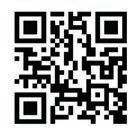
During the dry season in sub-Saharan Africa mature grass oxidizes. It transforms from green to yellow, until nally grey and dead. Grass is made up of cellulose or carbon. When oxidized, it is released into the atmosphere as carbon dioxide. It’s worse when it is burned, because carbon dioxide and other greenhouse gases are released even more quickly. The more ecological option is for cattle to graze the grass and return their dung to the soil. A host of micro and macro-organisms such as dung beetles can bury carbon into the soil. Every gram of carbon in the soil can hold between 8 to 20 grams of water in the little pockets of space between soil particles. Raindrops can sink where they fall, and slowly release to roots when needed. The slow release allows for a longer growing season and draws more carbon dioxide into the soil. This in turn increases productivity and resilience of the grass, and ultimately the health of the cattle.

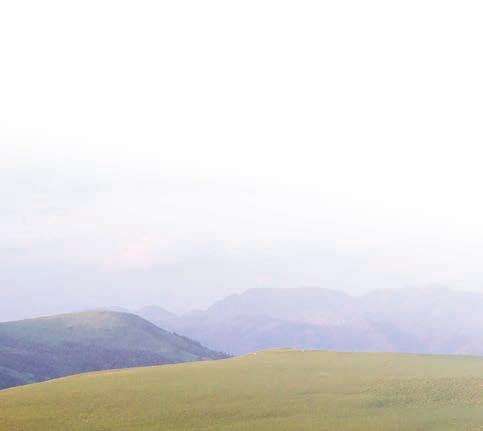





Communities in 14 wards in Chimanimani have bene tted over the years from amalgamating many small herds of cattle into one large community herd and rotating from one large grassy area to another to give the grass su cient time to recover and grow after being grazed. Herders today keep cattle bunched and moving to graze and trample grass, leaving mulch, dung and urine to stimulate the growth of new shoots of grass in the rainy season. Boys who used to have to herd livestock can now go to school. Women now have the choice to be paid as community herders, or to engage in other income generating activities instead of managing the small family herd. It also has made it easier for women to own cattle when they are managed as one large community herd.


PWRDF leverages its impact by partnering with other agencies in Canada and around the world. Here’s a snapshot of some of our successful collaborations between April 1, 2022 and March 31, 2023:
PWRDF allocates $90,000 from its reserves to an ACT Alliance appeal supporting the people of Ethiopia, in particular the residents of Tigray.

PWRDF allocates $30,000 to a Canadian Foodgrains Bank-funded project in Sindh province, Pakistan, the area most a ected by ooding.

Through its membership in the Canadian Foodgrains Bank, PWRDF joins the Humanitarian Coalition appeal to end hunger in sub-Saharan Africa.

PWRDF is among 18 leading aid organizations behind the #Aidfor Afghanistan campaign, calling for the removal of barriers limiting Canadian organizations from getting lifesaving aid to Afghans in need.
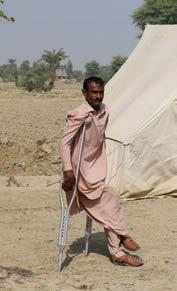
PWRDF joins the Humanitarian Coalition appeal to support ood victims in Pakistan.













October
PWRDF contributes $20,000 to a ood response in Pakistan with Episcopal Relief and Development in the U.S., Anglican Board of Mission in Australia (both fellow members of the Anglican Alliance), and the U.K.-based United Society Partners in the Gospel.


November
PWRDF and the Canadian Foodgrains Bank join forces to oversee a food assistance project with $1.3 million from the Humanitarian Coalition appeal to end hunger in East Africa, working with Church World Service in North Horr SubCounty and Marsabit County, Kenya.
A day after the 7.8-magnitude earthquake struck southeastern Türkiye on the Syrian border, PWRDF pledges $35,000 to the ACT Alliance to support an urgent response from its members working in Syria, and joins a Humanitarian Coalition appeal.
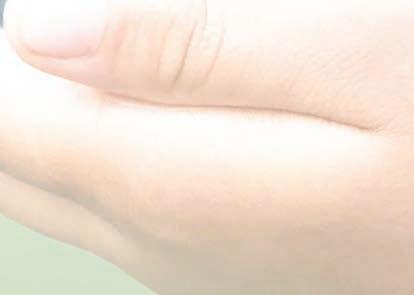
PWRDF allocates $260,000, along with $250,000 from our Canadian Foodgrains Bank account, to fund a three-month humanitarian response project in Kenya.
PWRDF is among 75 of Canada’s international aid agencies to lobby the government to increase Canada’s foreign aid spending through the Bigger than our Borders campaign.


Federal government introduces amendments to the Criminal Code which will nally allow Canadian organizations to provide critical humanitarian support that is so desperately needed in Afghanistan.





PWRDF allocations to ACT Alliance partner Hungarian Interchurch Aid (HIA) working in Ukraine now total $170,000.
PWRDF and some 20 ecumenical and development agencies with partnerships in Cuba invite the Canadian government to discuss solutions and actions to provide food and medicines due to the scarcity su ered by the population.

2,437 goats distributed to 656 Community healthcare workers


For the past three years, PWRDF has supported a Partners In Health project in the Neno district of Malawi to provide community health workers with goats as a source of secondary income so they may continue their work of providing essential healthcare services. To date, 2,437 goats have been distributed to 656 community health workers, while a remaining 572 workers are expected to receive goats by the end of the project’s fourth phase. Of this total number of goats distributed, 1,063 were born within the project as part of the “passing on the gift” component. When goats give birth to female kids, the kids are passed on to other community health workers when they have nished weaning and received their vaccinations. Through “passing on the gift,” an additional 84 goats have been distributed to 28 health workers.


PWRDF and the Episcopal Church of Cuba (ECC) have been partnering since 2019 on the Integral Development Program (PDM Program), which aims to foster awareness and empowerment among rural and poor communities to end food scarcity, poor nutrition and dependency. This year, 50 new community promoters received training, bringing the total number of community promoters trained through the program to 134. Meanwhile, 50 communities bene tted from 966 development projects that were supported by the PDM program.

A joint project in Guatemala and Mexico began assisting Indigenous communities in January 2023, to combat food insecurity through sustainable development programs. PWRDF is supporting Xilotl Asociación para el Desarrollo Social A.C. Ocosingo in México and ODIGUA Sembrando Esperanza in Guatemala to build stronger communities. Five hundred families living in 12 communities of the Tzeltal in Mexico and Q’eqchi´ in Guatemala will participate over the next two years. Communities will improve food security through sustainable agriculture practices and selling their surplus produce, while also empowering women to exercise their rights, reduce poverty and achieve a higher quality of life.
The Climate Smart Agriculture dairy farming project with Ecumenical Church Loan Fund (ECLOF) Kenya continued to grow and build on previous success. As farmers increased their yields, improving local food security, they also increased their revenue. Two new demonstration farms were launched and 414 farmers participated in training on sustainable nancing, planning and dairy practices such as climate smart feed and constructing climate smart cowsheds. This project will train 2,000 farmers, including 1,000 women and 500 youth, on climate adaption and resilient farming practices. To date, the project has also established nine climate smart agriculture partnerships and trained 42 board members on good governance practices.
45 shallow wells built with 15 using solar power


PWRDF is working with Utooni Development Organization (UDO) on a shallow wells project to increase water access amid the worst drought in 40 years. Over the three-year span of the project, UDO helped community groups build 45 shallows wells – 30 of which draw underground water through hand pumps (demonstrated here by Archbishop Linda Nicholls) while 15 work through solar-powered pumps. By the end of July 2022, only one of these wells had run dry despite the drought. Access to shallow wells reduces the spread of water-borne disease and shortens the distance that women and children must travel to reach water sources, allowing children to attend school. Shallow wells also reduce the number of injuries caused when hand-dug scoop holes cave in.

PWRDF is supporting the Ahli Arab Hospital in Gaza to respond to increasing demand for healthcare services brought on by ongoing con ict, economic collapse, movement restrictions, water shortages, long hours of electricity outages and the dramatic deterioration of livelihood options. PWRDF has also partnered with the hospital – run by the Diocese of Jerusalem – on a project which is supporting 500 women and 200 men in creating awareness about osteoporosis, including early detection and treatment. To date, 190 vulnerable women have been diagnosed with osteoporosis and are undergoing treatment to alleviate related symptoms and prevent the disease from developing. The Gaza Strip is one of the most densely populated areas in the world and the hospital serves all patients regardless of religion, gender, socioeconomic status or political a liation. The Ahli Arab Hospital has 80 beds across several departments including surgery, general medicine and pediatrics.

This past year, PWRDF partnered with Muso Health to increase access to COVID-19 vaccines in rural Mali. By the project’s end, 24,637 vaccine doses were administered to eligible people in three districts. This selection was based on low levels of vaccination and high risk of infection. In Kéniéba and Kangaba for example, labour migration has resulted in higher rates of COVID-19 cases. Muso facilitated the project through 10-day mobile vaccination campaigns in each of the three health districts in partnership with the government and health authorities, while the Muso Technical Assistance team maintained and strengthened relationships with government partners. The vaccination campaign had a broader impact by increasing protection against COVID-19 and reducing the potential burden on health centres.
At the Bobete Health Centre in Lesotho, PWRDF is supporting Partners in Health (PIH) Canada and PIH Lesotho to provide quality maternal care. This year, 1,267 patients bene tted from maternal and infant care services which included routine antenatal care and postnatal care, malnutrition screening and management, elimination of mother-tochild transmission of HIV and community outreach and health promotion activities. During Bobete’s rainiest season in November and December, ooded rivers were a major obstacle in women’s ability to give birth in a health facility. Maternal waiting homes, created as part of this project, mitigate the risk caused by extreme weather. These homes provide a location for women who live far from the health centre to stay as they await delivery or undergo monitoring or testing during pregnancy. This year, 213 women were admitted to the maternal waiting homes – vastly exceeding the 144-person capacity of the homes.
6 rural communities received sexual health education for LGBTQIA+ awareness


CoCoSI has been working in rural communities for 23 years. The lack of sexual health education contributes to abuse and sexual violence and there are high rates of teen pregnancies. The lack of non-binary gender education leads to discrimination, isolation and hate crimes against the LGBTQIA+ population in schools, families, churches and communities. There is a total absence of a local public policy to support the LGBTQIA+ populations. The Educating and Fostering Youth and LGBTQIA+ Leadership for Gender Justice project in Cabañas, El Salvador is being implemented in six rural community schools in three municipalities. This project works directly with adolescents, parents, teachers, local organizations and local governments to promote Sexual Reproductive Health and Rights within the general population, and to advocate for respecting human rights of LGBTQIA+ people.


Rape Hurts Foundation is providing women and youth in Eastern Uganda with information and marketable skills to increase resilience against sexual and gender-based violence (SGBV), female genital mutilation (FGM), human tra cking and modernday slavery, human rights abuses, and socio-economic exploitation. The program linked 243 women and 192 youth a ected by SGBV and FGM issues to legal aid, court services and the police. While the courts helped in the prosecution of some of the perpetrators, 78 cases were handled out of court through mediation and arbitration. Women involved in legal action received follow-up care.
After more than 60 years of armed con ict in Colombia, ILSA is contributing towards peace and social justice for women and small-scale subsistence farmers in rural areas of the Páramo de Pisba. For the past three years, PWRDF has funded ILSA in supporting 300 women from nine municipalities in Pisba in exercising their individual and territorial rights. Now PWRDF is embarking on a four-year project with ILSA to train women in creating environmentally friendly products to earn an income. The project will raise the quality of life of all participants and increase the ability of women and their organizations to in uence public initiatives that support women and the Páramo territory.

In Berea and Botha-Bothe districts, Help Lesotho is training community leaders to accept their role in supporting girls’ mental, emotional and physical health and safety. More than 80 councillors, village chiefs, priests, teachers, village health workers, school representatives and community policing personnel attended intensive training sessions, followed by individual meetings. One of the chiefs, Mamookho Phakela, said that children had been skipping school and abusing drugs, which she felt was contributing to boys abusing girls and women in the village. After the training, parents reported a decrease in the high-risk behaviour. “The young people are no longer seen strolling around the village, but rather attending school properly,” she said. “The number of domestic violence cases reported has declined following the interventions.”
46 families gained access to hot and cold running water and 18 community youth were trained in installation
The long-term project to retro t homes in Pikangikum First Nation with safe, clean water is in its nal phase.To date, the project has trained and employed 18 youth community members to install the water and wastewater systems. Many of the families living in these homes include Elders who have diabetes or require dialysis and special care. When the water systems are completed in homes in the fall of 2023, the project will have provided 46 families with hot and cold running water in sinks, showers, baths and toilets. Most importantly, the quality of life and dignity of many of the most vulnerable in the community will have improved. The project has been supported over the years by many parishes and groups including Pimatisiwin Nipi (Living Waters) Group.

Scan the QR code to read the Rev. Canon Martha Tatarnic’s story on her July 2022 visit to Pikangikum.



An important step in reconciliation is the return of ancestral artifacts to their rightful First Nations. In Nova Scotia, the Mi’kamwey Debert Cultural Centre (MDCC) oversaw the transfer of a Mi’kmaw collection stored at the Smithsonian Institution in Washington, D.C. The MDCC worked with knowledge holders and experts to expand their understanding about these important collections. The new collection will enable the Mi’kmaw Nation to be the repository of their own cultural materials and safeguard digital versions of their oral histories, knowledge and language. It will also create economic impacts for the Nation as well as for the province and for Canada by expanding the Mi’kmaw tourism and heritage sectors.

At Medicine Eagle Camp, traditional Knowledge
Keepers teach students about the Anishinaabe medicines growing in the region and ways this knowledge has been passed on from Ojibway ancestors. Operating for more than 15 years, it is located on Keeseekoowenin Ojibway First Nation territory. The camp assists students in healing themselves and their family members by reconnecting to traditional culture, the land, and being in a reciprocal relationship with one another, Indigenous practices that colonial policies sought to destroy. In July 2022, two professors and 13 students from the University of Winnipeg attended the rst training session. In August, 25 university students, ve children and ve teachers attended a second training session facilitated by the Medicine Eagle Camp Elders.
The Gitanyow Health and Wellness Society in British Columbia, under the responsibility of their Gyets (Western) Gitxsan Indian Residential School (IRS) Program, assists survivors of Indian Residential Schools, their communities, and families to receive the tools to heal and learn. The Gyets Gitxsan IRS Program recognizes the need for a new approach to education within the local high school that is Gitxsan speci c. PWRDF is supporting the development of new curriculum that will educate, raise awareness, and restore lost culture, language, history, self-awareness and wellness through connection to self and lax yip (land). This knowledge will in turn promote self-esteem, identity, revitalization of culture and language in three participating western Gitxsan communities. This curriculum aims “to take the lead in this initiative rather than wait and implement ‘regular status quo’ education that has not been working for our children.”
$30,000 distributed to 3,100 households to support recovery from ooding


During the 2022 monsoon season, Pakistan experienced unprecedented rains and devastating oods. More than 1,700 people died while more than 33 million others across the country were impacted as homes were destroyed and livestock were killed. In response to the devastation, PWRDF contributed $30,000 to a project led by Presbyterian World Service & Development and funded by the Canadian Foodgrains Bank and the Government of Canada, to provide monthly cash assistance to 3,100 selected households for three consecutive months. Ha za Bibi lives in the severely a ected southern region of Southern Pakistan and lost her daughter, husband and home during the monsoons. Ha za has received assistance through the project, so far receiving three payments of 12,000 rupees each ($58 Cdn). “This assistance has provided me some relief and allowed me to put food on the table for my children,” says Ha za. “I bought essential food items such as wheat our, rice, sugar, tea, milk and vegetables.” The project ensured outreach to the most at-risk communities.
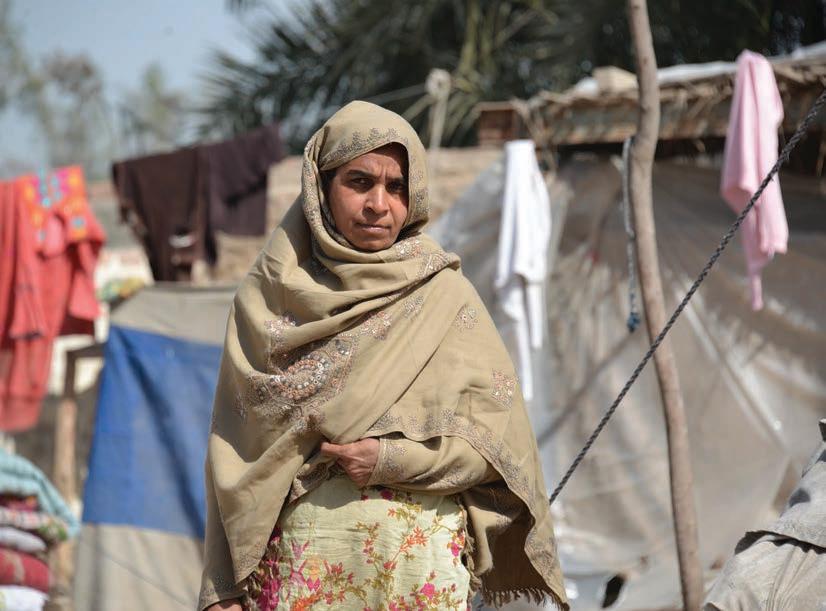
Hurricane Fiona hit Atlantic Canada in September 2022, leaving a path of destruction in its wake. In response to the devastation, PWRDF consulted with volunteers, churches and community members to learn the extent of the damage and impacts to communities. From these consultations, and while acknowledging funds committed by the government, PWRDF issued a funding appeal. In conversation with the Diocese of Nova Scotia and Prince Edward Island, a Hurricane Fiona Resiliency and Response Advisory Committee was established to suggest ways forward and plan for the best use of funds to leverage and not duplicate funds and e orts from others. A process was established by the Diocese to solicit projects that would respond to needs and support longer term planning, preparedness and awareness for any future hurricanes and other severe weather and climate events in the region. By the end of March 2023, the Diocese had o ered nancial assistance to several parishes including installing back-up generators, ensuring provisions for warming centres and enabling a safe space for community conversations where individuals could share their feelings about the climate crisis.

PWRDF continued to support internally displaced people in Ethiopia, primarily from the Tigray region who are now living in camps and refugee settlements. A grant of $90,000 was allocated to the ACT Alliance and pooled with nancial resources from other ACT Alliance members to improve the conditions in the camps. A new borehole in Seba Kare camp was built, and equipped with a pump, a reliable power source and guard house. A pipeline was also built from the borehole to a water storage tank. More than 10,000 people in the camp and almost 3,000 people in the host community are now able to access clean water. At Mai Weyni camp, the funds also supported a Child Friendly Space that was established in 2021. Almost 900 children are bene tting from a meal program, games and literacy activities.
Hurricane Ian made landfall in Cuba in September 2022 and lashed the western provinces for more than seven hours. In the end, the storm caused extensive damage to homes, elds, and electrical, telephone and hydraulic services, as well as other sectors. More than 100,000 homes (almost 60%) were damaged in the Pinar del Rio province. Pinar del Río also had the highest evacuation rate, including 228 families housed in evacuation centres who could not return to their homes. In response, PWRDF supported Centro Memorial Dr. Martin Luther King, Jr. with $20,000 towards their e orts to provide food, medicine and psychosocial rehabilitation for the most vulnerable families a ected.
1,000 households received cash assistance and 2,000 households received agricultural tools and seeds


Since April 2021, PWRDF has been supporting South Sudanese refugees returning from Uganda and the Democratic Republic of the Congo, through Finn Church Aid South Sudan with a grant from the Canadian Foodgrains Bank. This past year, cash assistance was provided to 1,000 returnee households so they could buy food and other basic items. These households also received agricultural tools, vegetable seeds and cereal seeds, along with 2,000 other households who are hosting the internally displaced households in ve Payams (administrative units) within Yei River County. Community mobilizers and 10 agriculture extension workers o ered training and extension services for these farmers who are grouped under the leadership of lead farmers. A total of 180 technical and vocational training graduates have started small businesses in groups. Training in conservation agriculture and village savings and loan associations are promoting resilience among the farmers.
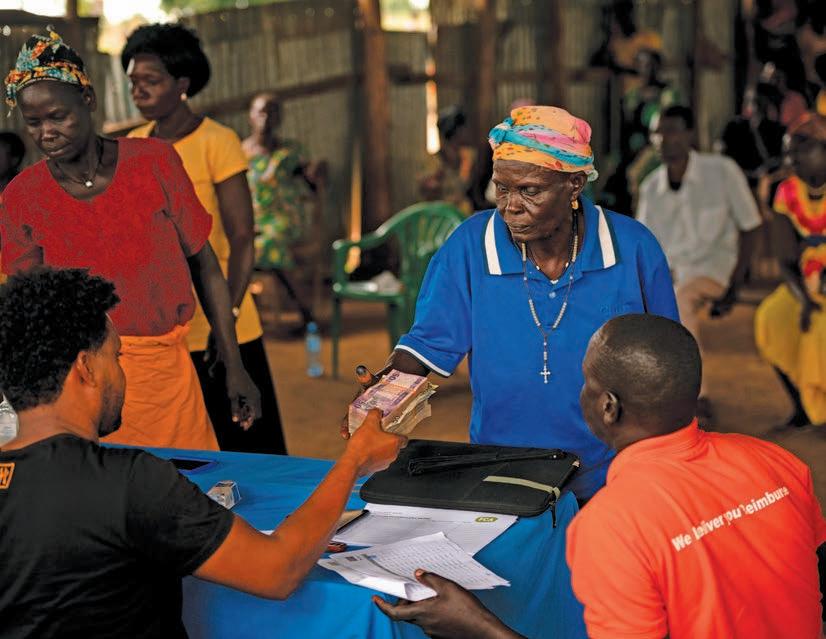
Year two of a three-year program to improve food security and nutrition in the Nyarugushu Camp in Tanzania produced results. This year 10 refugee extension workers were selected and trained to provide technical assistance to all the farmers. This included managing the ve multiple seedling nursery production centres in close collaboration with the lead farmers and project sta . The ripple e ects were manifold. Fifty extension workers and lead farmers learned how to train others. They in turn connected with 510 other households in the refugee camp, and trained them in nutrition, gender equality and sustainable vegetable production techniques such as composting and seed preservation.

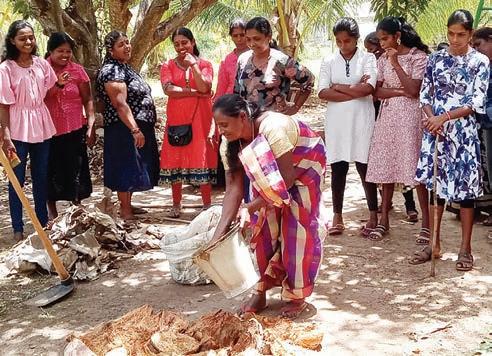
PWRDF continues to support the communitybuilding work of the Oppuravillam Peace Centre in Vavuniya, led by the Anglican Diocese of Colombo. Founded in 1991 by the Rev. Dr. Donald Jeyapalan Kanagaratnam, the centre acts as a community hub for neighbouring villages. The Centre’s presence in local communities has become a beacon of hope for villagers, many of whom have undergone several displacements during Sri Lanka’s civil war and have returned to situations of poverty as they begin to rebuild their lives. This year, PWRDF funded multiple initiatives within the centre, including a mini water puri cation system for a community drinking water project to be used by the local village and at the Oppuravillam Centre, and the further development of an organic vegetable and fruit farm as a cooperative venture for the village women’s groups. The Centre’s work includes a trilingual preschool, tutoring for school children in science and mathematics, counselling and community groups for women and a Youth Club.
Church World Service (CWS) is supporting the Roma community, a minority group who must contend with centuries-old discrimination on top of the ongoing challenges of war in Ukraine. Working with local organization Romni since October 2022, CWS has developed a team of six male and female Roma mediators to support at least 2,000 Roma who have ed to central and northern Moldova and Transnistria. By January 2023, mediators had reached over 700 Roma women, men and children. The mediators assist Roma refugees in accessing shelter, healthcare, education, food, clothing and transportation. They also provide advocacy, transportation and service fees, and follow-up care.
In 2022, PWRDF launched the Wild Ride, raising funds and awareness for partners working with refugees and Internally Displaced People. As we had done during the rst years of the pandemic with the Ride for Refuge, we invited people to be creative with their participation and “put their stamp on it.” Besides cycling and walking, our fundraisers did jigsaw puzzles, paddled kayaks, organized and performed in concerts and crocheted baby blankets in support of the cause. The 12 teams and 55 participants raised almost $50,000!

During the pandemic, Praying with PWRDF became an important way for people to stay connected to PWRDF partners, and each other. Three years later, it’s still a mainstay in many people’s routines. Our Lent 2023 devotional resource was a collection of memorable re ections, with music, videos, PWRDF stories and more. Seven re ectors were featured and each day subscribers received an email to guide them through Lent, praying, re ecting and learning more about PWRDF’s good work. More than 1,000 people subscribed to the resource.
During Advent 2022, Dr. Sylvia Keesmaat, a renowned biblical scholar and writer, invited subscribers to connect women of the bible to our own hopes and grief in this time of climate crisis.
More than 1,300 subscribers received daily scripture readings, re ections, prayers and PWRDF stories in their inbox and Dr. Keesmaat included questions ideal for a weekly Bible Study.

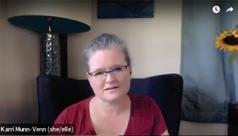




The second year of the Creation Care: Climate Action Education Focus, looked at climate change and gender. Each Bible Study was anchored by a video conversation between women from the north and south on the front lines of climate change.


Volunteers at St. Mark’s Church in Qualicum Beach, B.C. cheered when they totalled up the contributions made on their Day of Giving to Ukraine held on September 9. In just two hours, from 10 a.m. until noon, they collected $6,500. Besides parishioners, people also came from the farmer’s market and other organizations to give to PWRDF’s Ukraine appeal. Additional donations from St. Mark’s congregation and others boosted their total to more than $12,000.

The Church of Saint Andrew in Cole Harbour, N.S. has a yearly Advent program to raise funds for PWRDF partners and programs. In 2022, they promoted the Special Delivery kits in Lesotho and called it their ‘Oh Baby’ campaign. Each time a parishioner donated $25 for a new baby kit, they placed a diaper in a bassinet in front of the altar. By Christmas, the bassinet was brimming with diapers (donated to a local women’s shelter) and $2,150 was donated to PWRDF.

Holy Trinity Guildwood in the Diocese of Toronto designated its Christmas Bene t Concert to support PWRDF’s Hurricane Fiona response. PWRDF Executive Director Will Postma updated those gathered about the aftermath and destruction caused by Hurricane Fiona and the needs following emergency situations around the world, immediate and long-term. Thanks to the generosity of parishioners and friends, $1,940 was raised to support those a ected by Hurricane Fiona.
Anglican Church in Bala, Ontario celebrated its 100th Anniversary in 2022, one year late because of COVID. In recognition, the Anglican Church Women (ACW) chose to fund the construction of a shallow well with a hand pump from the World of Gifts guide. Because their fundraising activities were curtailed for two years, they funded half of the project from their own personal donations. The $1,200 will be used to build the well, providing clean water and improving the health of a rural community in Kenya.
In 2022, St. Andrew’s in Langley, B.C. announced that the parish outreach event would support PWRDF’s equity account in the Canadian Foodgrains Bank. Each week during Lent, a glass jar was layered with grains and legumes. The parish rep stood outside the church door every Sunday after the service and held out another glass jar decorated with the PWRDF logo. By the end of Lent, the campaign had raised $1,920!
Supporting the work of PWRDF improves the quality of daily life for vulnerable populations by promoting global justice and self-sustainability. Your commitment is transforming lives.



In the context of prolonged con ict and extreme hunger, PWRDF sees the growing importance of a people-centred response and learning from community members to best respond to local priorities.

IMPROVING
: A deeper community-centered response can lay a path from relief to resiliency. In Kenya, Church World Service implemented four food assistance projects in Marsabit County in response to extreme hunger caused by the persistent droughts, local con ict and excessive food costs. Communitybased advisory committees became more involved in project design, implementation and monitoring. These advisory committees selected the most food insecure households, handled complaints, managed distributions e ectively and e ciently and carried out post-distribution monitoring visits.
In South Sudan, our partners are working with government extension workers by supporting them with further training in marketing produce and agricultural methods, drawing in global and regional learnings on innovative practices. In Nyarugushu refugee camp in Tanzania, extension workers are selected from within the refugee community itself, women and men who have prior experience in vegetable and agriculture production from the countries where they have had to ee.
Our membership in the ACT Alliance and the Canadian Foodgrains Bank allows us
to work with partners on the ground who have the best understanding of the local context. We have seen this in Ukraine where PWRDF has worked with seven local partners whose sta are living and working in con ict areas, focusing on psychological care and healing of children and adults as well as care for people living with disabilities.
Our work with local partners allows timely and e ective use of nancial resources. Partners can also learn from each other. We have facilitated exchange visits between implementing partners and have supported coordination mechanisms that o er more agency for local partners, to decide together on project activities based on local realities and context.
FOSTERING LEARNING: PWRDF has developed new connections with academia. Graduate students worked with us to develop a next strategy, assess our environment and listen to partners. A valued project design came out of engagement between youth in El Salvador and PWRDF’s Youth Council to develop a program speci cally focused on allyship and support of LGBTQIA+ youth.
With Indigenous peoples, we gathered insights on more re ective and exible program design in response to community priorities. The Indigenous Program Advisory Committee (IPAC) is helping us re ect more deeply on programs of language learning, midwifery, cultural preservation and empowering youth and communities coping with intergenerational trauma.
PWRDF has been accredited by Imagine Canada since 2013 and continues to meet or exceed the requirements to maintain this important standard. We take the utmost care in stewarding our donors and putting your contributions to good use. This annual report shares the positive results and progress you make possible.
• Donate online at pwrdf.org/give-today, or by phone at 1-866-308-7973.
• Become a monthly donor and provide a steady source of funds to help maintain our vital work. If you are already a monthly donor, please consider increasing your gift this year.
• Realize a tax bene t through a gift of stock or securities.
• Make a pledge to schedule a larger gift over the year. You can also set up an Endowment for any of our program work so you can support us over a longer period of time.
• Make a donation in memory of a loved one, or in honour of friends and family members as a birthday or anniversary gift. Our annual World of Gifts guide has many giving options at pwrdf.org/world-of-gifts.
• Leave a gift to PWRDF in your will. You can ensure your support lives on for vulnerable communities, for Indigenous communities in Canada, for refugees and displaced people, and for caring for creation. Learn more about bequests at pwrdf.org/leave-a-legacy.
Learn more ways you can support PWRDF nancially at pwrdf.org/ways-to-give
(or scan this QR code), or contact us at pwrdf@pwrdf.org.

There are dozens of ways to engage your parish or community in our work. Order free brochures, bookmarks and donor envelopes, or share our videos with your group. Learn more at pwrdf.org/resources.
If your church doesn’t have a PWRDF Parish Representative, speak to your parish leadership or contact us. We can support you as you get involved.
Visit pwrdf.org/webinars to nd out more about our online opportunities. Stay connected through Zoom praying sessions and webinars.
• Subscribe to our monthly Email Update at pwrdf.org/subscribe
• Like us on Facebook @pwrdfcan
• Follow us on Twitter @pwrdf
• Follow us on Instagram @pwrdf_justgeneration
• Subscribe to our YouTube channel YouTube.com/pwrdf and share our videos with your community
• Read our newsletter Under the Sun, published in the February, June and October issues of the Anglican Journal and at pwrdf.org/under-the-sun
• Order more copies of this annual report for your parish at pwrdf@pwrdf.org. It’s also available in French!


